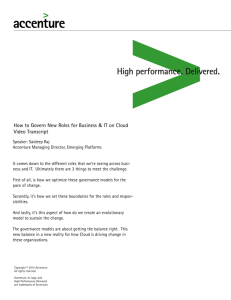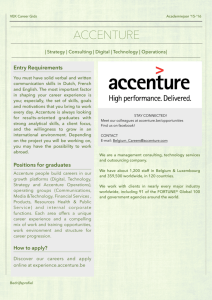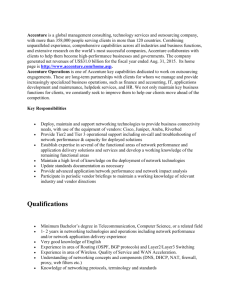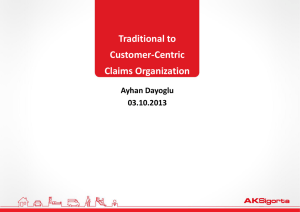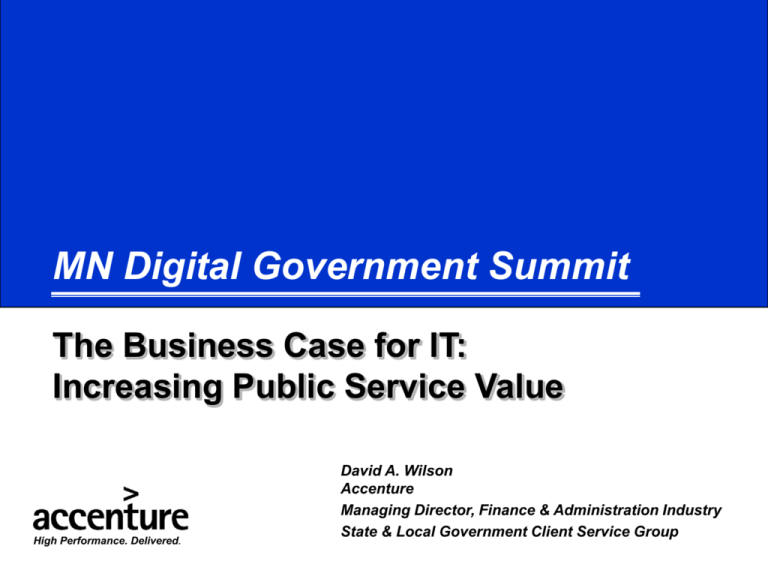
MN Digital Government Summit
The Business Case for IT:
Increasing Public Service Value
High Performance. Delivered.
David A. Wilson
Accenture
Managing Director, Finance & Administration Industry
State & Local Government Client Service Group
Copyright © 2006 Accenture All Rights Reserved.
Topics
•
•
•
•
•
Introduction
Public Service Value Defined
IT Benchmarking
Trends in IT Transformation
Q&A
Accenture 2007: All rights reserved.
2
Government IT must change to provide
more value for citizens
Demand for High Performing Governments:
•Governments are expected to hold the line on
expenses and taxes
•Citizen expectations and demands for improved
services are rising
•New technologies create an imperative to “keep up”
with change
•Major programs and traditional methods of service
delivery are being challenged, often under the rubric of
reform and consolidation
•Responsibility and accountability for programs is
shifting across government boundaries, with dramatic
effects on funding
•Transparency of information and accountability for
performance is creating demand for measuring,
comparing and documenting performance results
•Demographic trends are requiring governments to do
more with fewer employees
•Implementing IT solutions to enable government
services can be difficult, expensive, and often does not
deliver as much value as it should
Accenture 2007: All rights reserved.
3
Topics
•
•
•
•
Introduction
Public Service Value Defined
IT Benchmarking
Trends in IT Transformation
Accenture 2007: All rights reserved.
4
Accenture’s Public Service Value Model (PSV) applies the
principles of shareholder value to the public sector,
postulating that citizens value a maximum basket of
outcomes generated in a cost effective manner.
Accenture’s Public Service Value Model
Shareholder Value Model
Growth
Outcomes
Higher
Performing
Companies
Lower
Performing
Companies
Spread [ROIC – WACC]
•
•
Lower
Performing
Public
Services
Cost Effectiveness
Different combinations of Growth and
Spread drive intrinsic value creation
for shareholders and stakeholders
Enterprises can map their future
trajectory and take appropriate action
(long term strategy and/or immediate)
Accenture 2007: All rights reserved.
Higher
Performing
Public
Services
5
•
“Outcomes” are a weighted basket of societal
achievements
•
“Cost Effectiveness” = Outcomes / (Operating
Costs + Capital Charge)
•
Hypothesis: greater value is created through
generating improved outcomes in a more cost
effective manner
A Public Service Value focus for IT
• Outcomes must be balanced with cost
effectiveness
• Minimizing back office costs –
including IT costs - allows for more
resources to be dedicated to citizenfacing activities
• Measuring and comparing IT
performance is fundamental to
transformation.
Accenture 2007: All rights reserved.
6
Outcomes
• To create public value, organizations
must translate resources into a set of
real and tangible benefits, which are
valued by citizens, service users and
taxpayers.
Higher
Performing
Public
Services
Lower
Performing
Public
Services
Cost Effectiveness
Topics
•
•
•
•
Introduction
Public Service Value Defined
IT Benchmarking
Trends in IT Transformation
Accenture 2007: All rights reserved.
7
NASACT’s State Benchmarking Program
•
State steering Committee formed in 2004. A state steering committee was
formed with NASACT in early 2004 to explore the use of benchmarking. The
Hackett-Accenture team was selected to conduct a benchmarking pilot.
•
Pilot Benchmark project. Six states and selected agencies participated in the
benchmark pilot (Alaska, Arizona, Nebraska, Oregon, Tennessee and
Washington). Pilot results were presented at NASACT conference in November
2004.
•
State RFP issued through NASACT. In April 2005 NASACT conducted a
formal RFP to select a single benchmarking service provider.
•
Vendor selected and tailored program for states. In June 2005 The HackettAccenture team was formally selected to support the NASACT benchmarking
program in Finance, HR/Payroll, Procurement, and IT. Program launched at
NASACT annual conference, August 2005. Contract vehicle now in place for
states to select any or all benchmarks, based on their needs.
•
12 States are either in process or have completed the NASACT State
benchmark to date.
Accenture 2007: All rights reserved.
8
IT Benchmarking:
Measuring the Public Service Value of IT programs
1. IT Performance Data - Where are we and
how do we compare to other states and as
well as world-class organizations. Helps to
establish project priorities.
2. Baseline and future measurement for
technology investments - Provides a
baseline, supporting a “before and after”
comparisons when undertaking an
improvement project (such as data center
consolidation).
3. Foundation for Business Case - Provides
performance insights and quantitative
measures into process areas for
improvement that will be the starting point
for a transformation business case.
Accenture 2007: All rights reserved.
9
Accenture/Hackett’s IT benchmark framework
Technology
Infrastructure
Infrastructure
Management
Operations
Management
Security
Management
Disaster Recovery
Planning
Application
Management
Application
Maintenance
Application
Support
Enhancement
Delivery
Upgrade
Execution
Control & Risk
Management
Quality Assurance IT Business
Change
Planning
Management
Risk Management
Audit and
Compliance
End User Support Application
Help Desk
Development and
End User Training
Implementation
Planning
Infrastructure
Construct
Development
Implement
Planning
Alignment
Project
Prioritization
Communication
Enterprise
Architecture
Planning
Governance
Standards
Management
Emerging
Technologies
Construct
Implement
Accenture 2007: All rights reserved.
Planning &
Strategy
Technology
Evaluation
10
Management &
Administration
Function
Management
Function
oversight
Personnel
management
Policy and
procedures
oversight
World-Class is defined as top quartile performance
in both efficiency and effectiveness
Hackett Value Grid™
Peer Group
ABC Org..
Accenture 2007: All rights reserved.
EFFICIENCY
EFFECTIVENESS
• IT cost per end-user
• Process costs per end
user
• Technology Investments
• Number of FTEs
• FTEs per processing
groups
• Spans of control
• Number of Help Desk
Calls
• Projects meeting budget
• FTE productivity Applications
• Projects delivered on time
• Help Desk 1st call
resolution
• Number of data centers
• Number of applications
• Member of Executive
Committee
• Reporting relationship
• Percentage of budget
control
• Planning and strategy
resource commitment
• Business transactions
automated
• Projects meeting
requirements
• Percent SLA being met
(internally and externally)
• Standard adherence
• Vendor & supplier
rationalization
• Simplification of information
access
• Usage of self-service
• Degree of turnover
• Advanced business degrees
11
Excellence is no accident…. World-class organizations
operate and perform very differently than their median peers
Hackett 2006 Functional Performance Data
FINANCE
1.22%
45%
HUMAN RESOURCES
1,864
IT
PROCUREMENT
13%
0.85%
25%
1,614
-7%
8,458
9,024
0.64%
0.67%
Median
WC
Overall Finance cost
as a % of revenue
Median client has $5.5
Million in potential finance
process cost savings per $1
Billion of revenue
Accenture 2007: All rights reserved.
Median
WC
Median
Overall HR cost
per employee
Median client has $2.5
Million in potential HR
process cost savings per
10,000 employees
WC
Overall Procurement
cost as a % of spend
Median
WC
Overall IT cost
per end user
Median client has $2.1 Million
Median client spends
in potential procurement
$5.7 Million less per 10,000
process cost savings per $1
end-users; less adept
Billion of spend
at leveraging IT to reduce
labor costs
12
States Participating in Benchmarking
(as of July 2007)
Program Launched at NASACT Conference in Portland in August 2005
State
Benchmark
Tennessee
FIN, HR, IT, PROC
Completed
Arizona
FIN
Completed
Delaware
FIN, PROC
Completed
Colorado
FIN
Completed
Massachusetts
FIN
Completed
Mississippi
FIN, HR, IT, PROC
Completed
Georgia
FIN, IT
Completed
Alaska
HR
Active
Alabama
FIN, HR, PROC
Active
New Jersey
FIN, HR, PROC
Active
Ohio
FIN, HR, IT, PROC
Active
Oklahoma
FIN
Active
Accenture 2007: All rights reserved.
13
Status
Topics
•
•
•
•
Introduction
Public Service Value Defined
IT Benchmarking
Trends in IT Transformation
Accenture 2007: All rights reserved.
14
New Business Demands on IT:
Requires a Different Style of Infrastructure
New technology capabilities and competitive pressures are driving businesses
to become “Always On, Always Active, Always Aware”
Characteristic
Implications on Infrastructure
• Being in constant contact with suppliers,
partners, products and customers across
value chains will increasingly be a
business norm
Applications and services are constantly available
• Significant increase in the quantities of
data flowing into the enterprise; real time
and offline analytics create competitive
advantage
Traditional security boundaries change – greater
reach, granularity and federation
• Increasingly mobile workforce, requiring
computing capabilities wherever they
work
• Business processes and applications
must change to be able to accommodate
increasingly unpredictable demand
Accenture 2007: All rights reserved.
Maintenance windows no longer exist; changes
must be able to be made while “online”
Virtualized storage; variable capacity networks;
self-protecting data; intelligent automated
processing of data to filter out ‘noise’
Seamless networking, regardless of location
Multiple device support; greater use of thin clients
Sharing of resources across applications;
virtualization; integration based on standards;
composite applications
15
Trend Towards Shared IT Enterprise Services:
Consolidation and Redesign of IT Infrastructure into
Shared IT Services across agency boundaries.
The objective of these IT Common Services is to deliver the optimum
in cost-effective, high quality services.
Shared
IT Enterprise
Services
Scale & Efficiency
Centralized
Model
Focus on both increased
efficiency and increased service
levels within the IT
infrastructure
Advent of Client/Server and ERP
technologies
Ability to reengineer processes
to:
Distributed
Model
Service & Perceived Responsiveness
Accenture 2007: All rights reserved.
Early adoption in the U.S.
private sector demonstrated
potential
16
Optimize degree of sharing to
achieve scale
Incorporate best practices
Maintain end-to-end process
integrity and control
Targeting 15 - 30% productivity
improvements
Shared Enterprise IT Services Model
Definition
• Shared IT enterprise services are any infrastructure offerings
within an enterprise that have a separate set of dedicated
resources (e.g. people, assets) managed through a single,
centralized organization that serves more than one business unit.
Objectives
• Consolidate and redesign infrastructure, staff and support
functions to deliver the most cost effective and high quality
services possible
Accenture 2007: All rights reserved.
17
Building the Enterprise IT Service Model:
IT Enterprise Services Trends in Government Organizations
Consolidation
of facilities,
hardware, and
software
Shared
computing
environments
and lower
operating
costs
Realignment
and possible
relocation of
IT staff
Deployment
of innovative
technology
solutions
Best utilization
of skill-sets and
labor
requirements
across the state
Improved
agency
operations
and citizen
services
Implementation
of significant
cost-savings
initiatives
Creation of
innovative
partnerships
with the
private sector
Providing cost
Reduced
effective and
overall cost of
technology to enhanced services
States and
through publictheir agencies
private
partnerships
Continuing budget pressures, demands for more better
services and a more secure environment, are driving
IT enterprise initiatives.
Accenture 2007: All rights reserved.
18
Industry Sample Consolidation Savings
Infrastructure
Layer
Example
Components
Network
•
•
•
LAN/WAN
Voice/Video
Remote/Internet
Platforms
•
•
•
•
Data Center
Legacy Systems
Intel/Unix Servers
Desktop
Enterprise Enabling
Infrastructure
•
•
•
•
•
•
•
•
•
•
•
•
•
•
Email Consolidation
Intranet/KM
Middleware/EAI
Database
Component Frameworks
Application Server
Dev. Env’t. and Tools
Risk Assessment
Security Architecture
Enterprise Security
Managed Services
Performance Planning
High Availability
Service Level Mgmt
Application Enabling
Infrastructure
Security
Operations
Management
Typical %
IT Cost
Reduction
•
•
•
•
•
•
•
WAN Migration to IP-VPN’s
Voice/Video/Data Convergence
Carrier Renegotiation/RFP
Use of Managed Services
Data Center Consolidation
Server/Storage Consolidation
Outsourcing/Out-tasking
•
•
•
License/maintenance fees
Eliminate duplicate services
Corporate data architecture
• Component Reuse
• Development/Training Costs
• Development Infrastructure
• Reduced Outages
• Loss Prevention
• Single Sign-on
•
•
•
•
Contractor Rationalization
Outsourcing/Out-tasking
Reduced outages/downtime
Automation
Total
*Savings may be recognized in other areas of IT
†Savings may be much higher in terms of loss prevention
Accenture 2007: All rights reserved.
Sample Cost
Reduction
Opportunities
19
10 - 20
20 - 35
20 – 35*
15 – 25*
5 – 10†
15 – 30*
15 – 30%
IT Investment Benefits
Benefits:
Significant increase in business value
Enhanced business
capabilities
IT Transformation
Gross savings in IT
spend
Enhanced IT
capabilities
Optimized IT
spending mix
• Moderate initial investment
can drive significant
stakeholder value returns
• A way to get “bold” change
across all of a government IT
organization capabilities
• Strengthens long-term
relationships at the top level
between IT organization and
government executive
leadership
Moderate initial investment
Accenture 2007: All rights reserved.
• 15-40% improvement in cost
of IT (depending on IT
organisation and systems
maturity - and level of
courage)
20
Transformed Government
Citizen View of Government: Focused on Outcomes…. Not Programs,
Systems and IT
Agencies
Policy
Administrative
Shared Services
Financial
Departments
Common Citizen
Services
Persons
Business
Regulations.
Tax
Payments
Purchasing
Human Resources
Technology
Case
Management
Transaction
Management
Common
Enterprise
Service
Shared IT
Infrastructure
Single Entry to Government
Services
21
Accenture 2007: All rights reserved.
Wrap-Up
Q&A
Accenture 2007: All rights reserved.
22


